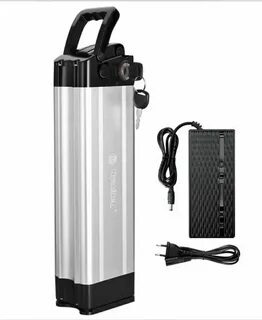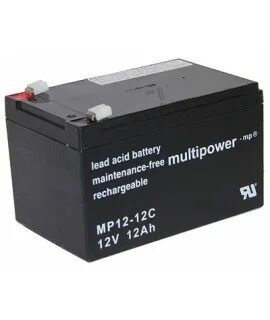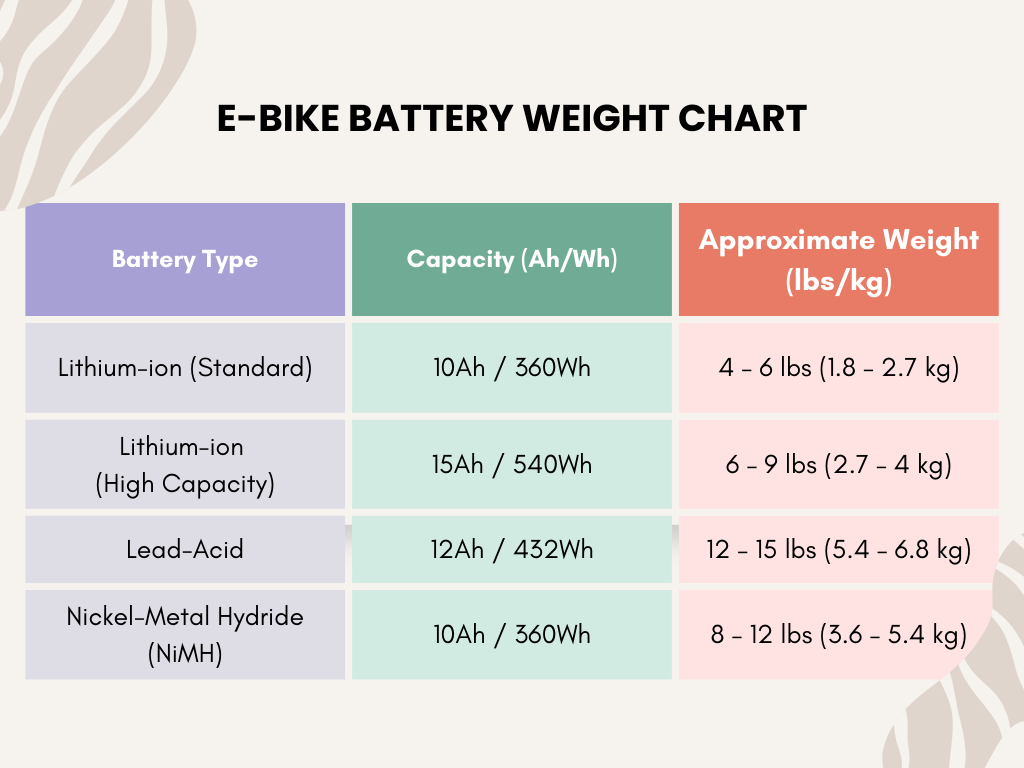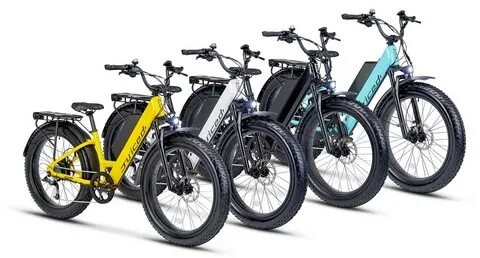E-bike Batteries Weight, When choosing an electric bike, one critical factor is the e-bike battery weight. It affects everything from speed and range to portability and overall ride comfort. Whether you’re a commuter or an adventure rider, understanding electric bike battery weight can help you pick the right battery for your needs. In this guide, we’ll break down the key factors influencing e-bike battery size and weight, provide a battery weight comparison chart, and help you make an informed choice.
Table of Contents
Table of Contents
E-bike Batteries Weight
Why Do E-bike Batteries Vary in Weight?
The weight of an e-bike battery is influenced by several factors:
- Battery Type: Different battery chemistries impact overall weight and performance.
- Battery Capacity (Ah & Wh): Higher-capacity batteries store more power but weigh more.
- Battery Case & Design: Some batteries are compact and lightweight, while others have heavier protective casings.
Key Factors Affecting Battery Weight
1. Battery Type:
- Lithium-ion (Li-ion): The most popular option, offering a balance between weight, power, and longevity.
- Lead-acid: Cheaper but significantly heavier and less efficient.
- Nickel-metal hydride (NiMH): Heavier than Li-ion but lighter than lead-acid, though less common today.
2. Battery Capacity:
- Measured in ampere-hours (Ah) and watt-hours (Wh).
- A higher ebike battery capacity provides a longer range but increases weight.
3. Battery Design:
Compact and integrated designs weigh less than bulky external battery packs.
Average Weight of an E-bike Battery
How Much Does an E-bike Battery Weigh on Average?
E-bike Batteries Weight can range from 3 lbs (1.4 kg) to 15 kg (33 lbs), depending on type and capacity.
- Lithium-ion batteries: Typically 4–9 lbs (1.8–4 kg).
- Lead-acid batteries weigh 12–15 lbs (5.4–6.8 kg).
- NiMH batteries: Typically 8–12 lbs (3.6–5.4 kg).
Battery chemistry plays a big role, with lithium-ion e-bike batteries being the lightest and most efficient option.
Lithium-ion batteries

Lithium-ion batteries
Lithium-ion batteries are rechargeable energy storage devices known for their high energy density, fast charging, and long lifespan, widely used in electronics and electric vehicles.
Lead-acid batteries

Lead-acid batteries
Lead-acid batteries are rechargeable energy storage devices using lead dioxide and sulfuric acid to generate electricity, commonly used in automotive and backup power applications.
NiMH batteries

NiMH batteries
NiMH (Nickel-Metal Hydride) batteries are rechargeable batteries known for higher energy density and lower memory effect than NiCd batteries.
E-bike Battery Weight Chart
Here’s a handy E-bike battery weight comparison chart to help you compare different battery types and their weights.

How E-bike Batteries Weight Affects E-bike Performance
- Speed & Acceleration: Heavier batteries slow down acceleration.
- Range: Larger capacity batteries provide a longer range but add weight.
- Portability: Lighter batteries are easier to remove, carry, and charge.
Best Lightweight E-bike Batteries for Long Rides
Looking for a lightweight option without sacrificing performance? Consider these top-rated lightweight e-bike batteries:
- Bosch PowerPack 400—lithium-ion, compact, and durable.
- Shimano Steps BT-E8010—Energy-efficient and lightweight.
Samsung SDI 36V—Offers a great eBike power and performance balance.
How to Choose the Right E-bike Battery Based on Weight
To pick the best battery for your electric bike, consider:
- Commuting vs. Adventure Riding: A 10Ah lithium-ion battery is great for daily commuting, while a 15Ah battery suits longer rides.
- Weight vs. Power Trade-off: A higher-capacity battery means a longer range but also adds extra weight.
Mounting Compatibility: Ensure the battery fits your e-bike’s frame or rear rack.

Conclusion
Understanding e-bike battery weight is key to selecting the best battery for your riding style. Lithium-ion batteries offer the best balance between weight, power, and longevity, making them the preferred choice for most riders.
FAQs
- Best E-Bike Batteries for Long Range
- Choosing the right e-bike battery for long-range travel involves considering a battery’s capacity, voltage, weight, and durability.
- How much does an e-bike battery weigh on average?
- Between 3 lbs (lightweight) and 15 kg (high capacity).
- What is the best lightweight bike battery?
- Bosch PowerPack 400, Shimano Steps BT-E8010, and Samsung SDI 36V are excellent choices.
By considering weight, capacity, and battery type, you can choose the best battery for your electric bike and enjoy smooth, efficient rides!
Final thoughts
By considering weight, capacity, and battery type, you can choose the best battery for your electric bike and enjoy smooth, efficient rides!








